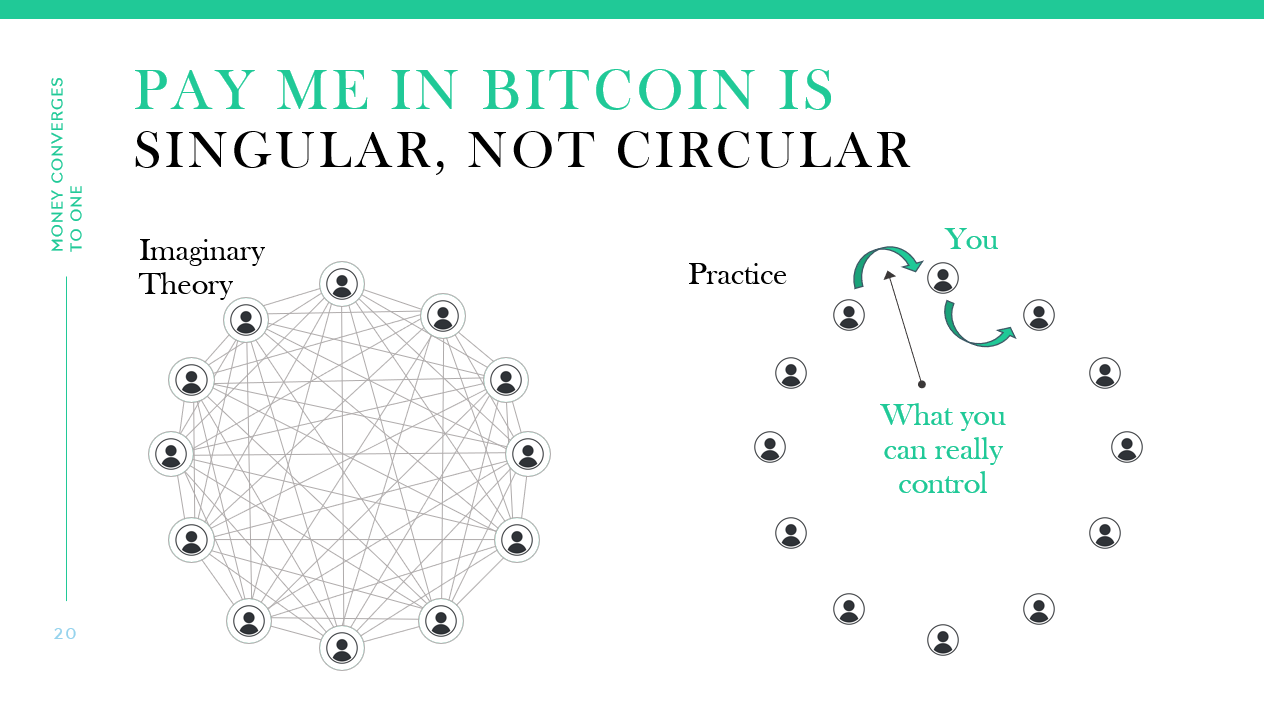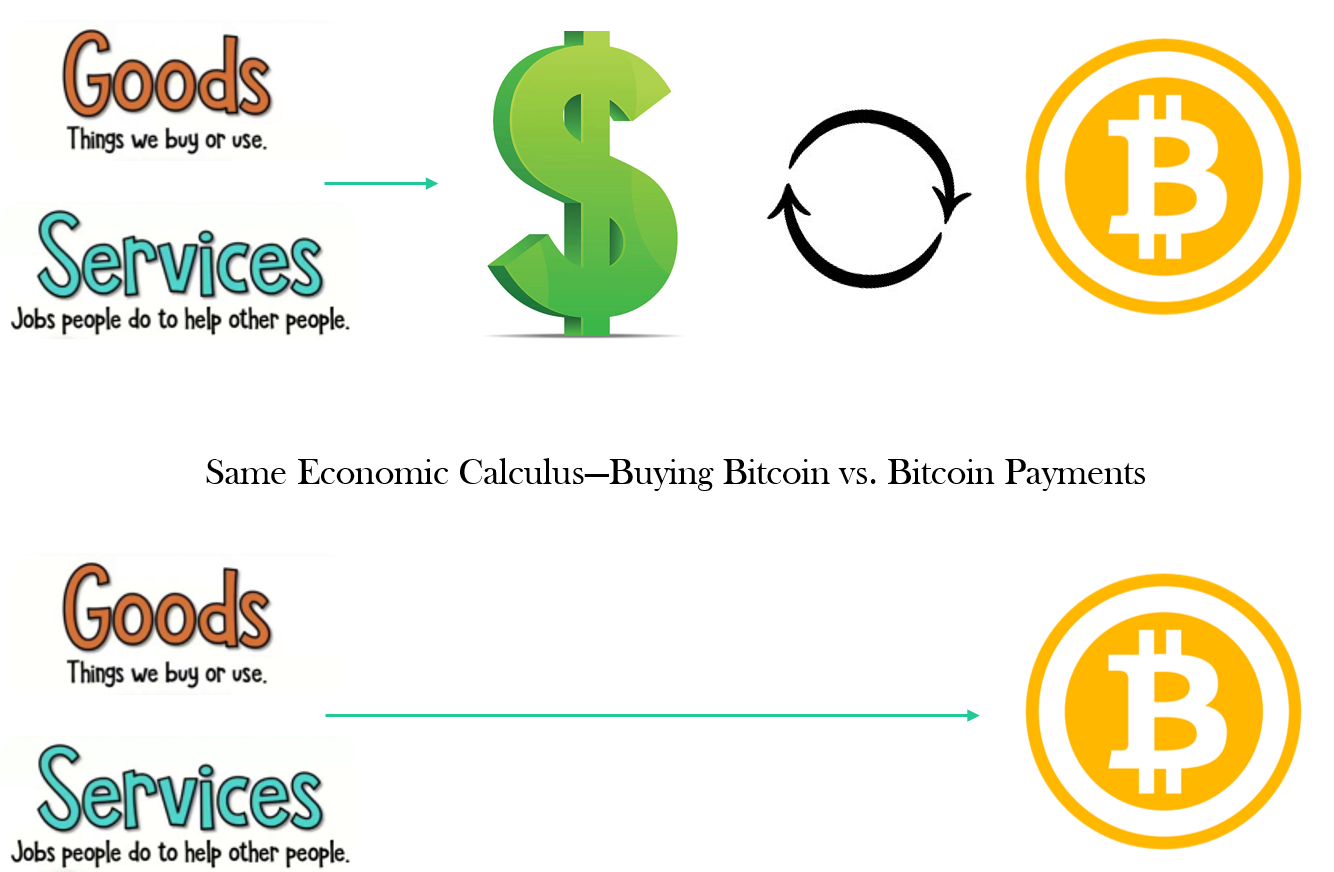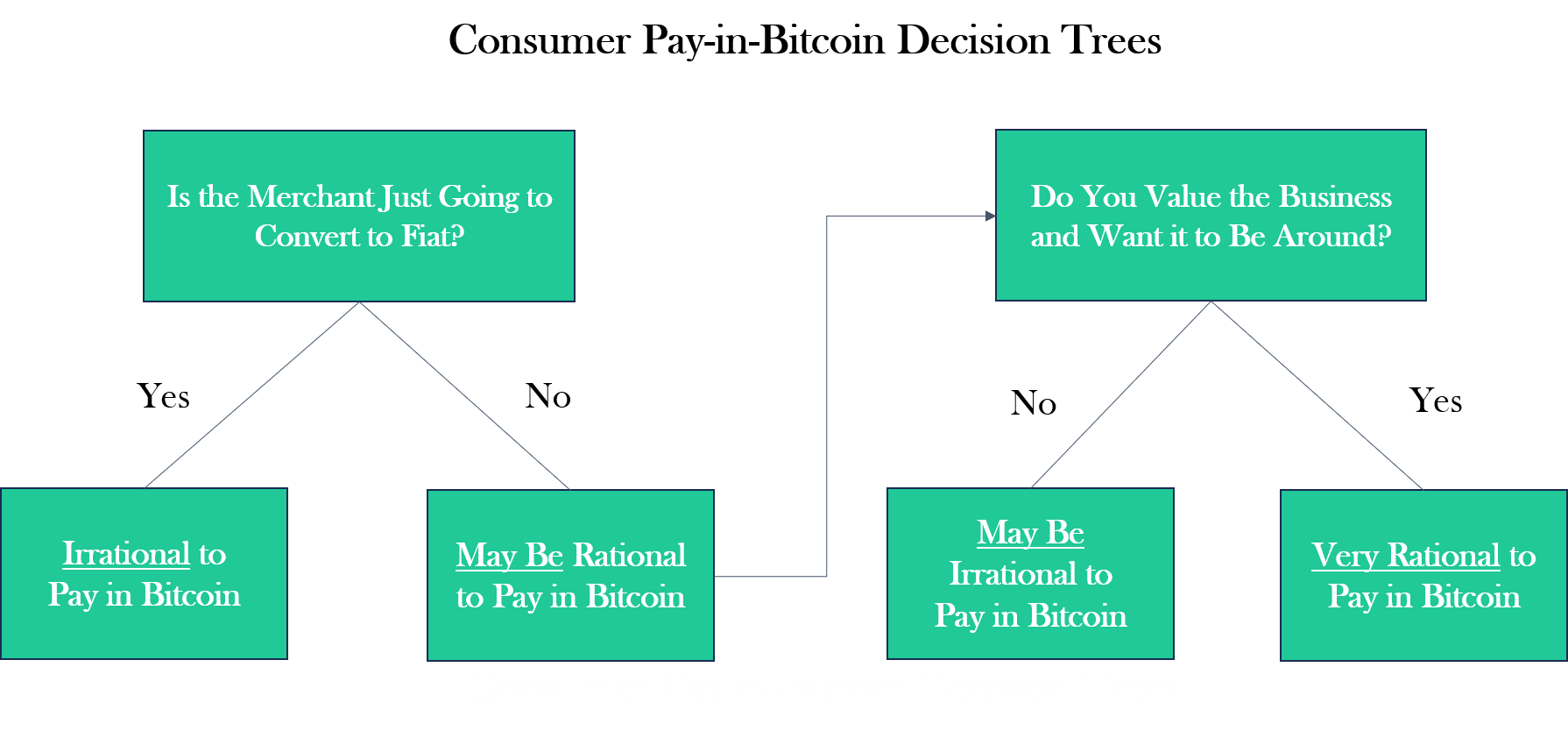Pay Me in Bitcoin Theory

Today, bitcoin is used predominantly as a long-term store of value. What I put forward is that bitcoin will transition from an exceptional store of value (albeit volatile and a bit clunky) to a currency used day-to-day that facilitates trade directly for goods and services. And that ultimately, virtually all goods and services in the world will be both priced in bitcoin and traded in bitcoin. Bitcoin's end game is as a price system and the following is how I see the transition beginning.
My Pay-Me-in-Bitcoin Theory of Bitcoin Payments Summarized:
-Someone must understand why bitcoin stores value to want to be paid in it
-Receiving bitcoin payments is a balance sheet decision at the end of day
-Merchants will drive the shift to bitcoin payments (for this reason)
-Specifically merchants who understand why bitcoin stores value
-Business owners are ultimately in control of what currency to accept
-Spending bitcoin can be both rational and irrational for consumers
-Spending bitcoin is rational if the merchant is valued and saves in bitcoin
-Accepting bitcoin payments does not mean not accepting fiat payments
-The transition to payments will be gradual, similar to saving in bitcoin
Endgame–Store of value to Unit of Account, A Price System
A few weeks ago at BitBlockBoom, I gave a presentation explaining that the end game of bitcoin is as a price system. Over time, bitcoin will transition from a nascent and niche store of value–that is predominantly exchanged for fiat currencies–to a transactional currency facilitating direct commerce for goods and services. Ultimately, the price of all goods will be denominated in bitcoin and trade will be effected directly in bitcoin, rather than through fiat currencies as indirect intermediaries. To quickly catch everyone here up, the logic is as follows.
Bitcoin effectively stores value over time because it has a fixed supply. There are two economic principles that I believe are true (in an objective sense). Both would need to be accepted as true in order for the rest of the logic to follow. First, economic systems converge on a single form of money due to the intersubjective problem of trade–i.e., I must have the form of money you are willing to accept for us to trade (and vice versa), which extends to the next person and the next and ultimately to everyone in the world. And second, economic systems naturally converge on the scarcest form of money. People would rather be paid in a form of money that cannot be printed–rather than in a form of money that can be easily printed–because the former will more effectively store value between exchanges (download Bitcoin Obsoletes All Other Money for more on these principles).
In short, everything is tied to bitcoin's fixed supply of 21 million. If bitcoin's fixed supply is credibly enforced, then bitcoin translates to a form of money that cannot be printed at all (i.e., the scarcest form of money). If bitcoin stores value over time (due to its fixed supply), people will naturally want to conduct trade for goods and services directly in exchange for bitcoin. People will demand to be paid in the form of money that best stores value rather than inferior forms of money–and a finitely scarce form of money will store value better than any other form of money. If bitcoin is used to facilitate trade directly for goods and services, that trade will naturally become denominated in bitcoin over time. So all in, if bitcoin credibly enforces its fixed supply, it will not just be a store of value, but instead, bitcoin will inevitably be used to facilitate trade directly and will become the unit of account.
At the end of the day, this will mean food at the grocery store, gas at the gas station, your power and water bills, healthcare, real estate, etc. all being priced in some denomination of bitcoin and paid for directly in bitcoin. But how would (or could) the world logically transition from where it is today with very few bitcoin payments to that end state where practically everything is priced and traded in bitcoin?
Order of Operations
In my experience, this is not a chicken and egg dilemma as to which comes first. There is logical order. Humans first must reasonably expect a good to store value (over some time horizon) in order to trade their finitely scarce time–which translates to the output of their labor–in return.
At this early stage of bitcoin adoption, for someone to want to be paid in bitcoin, it is logical that they must first have some reason to expect bitcoin will store value. While most people in the world might get their first bitcoin by being paid in bitcoin when all is said and done, it is far easier today to buy some bitcoin through an exchange for fiat currencies than it is to be set up to get paid in bitcoin. The logical progression is for someone to begin saving in bitcoin by buying it (the path of least resistance), gain a better understanding of why bitcoin stores value and once bitcoin begins to become intuitive as money, then and thereafter someone begins to think about accepting bitcoin payments directly.

For this reason, it is also logical that merchants (rather than consumers) will drive the shift to bitcoin payments. Built into this logic is the recognition that the fundamental decision to accept bitcoin as payment for goods and services–as a business or contractor–is more of a "balance sheet" decision as an input (i.e., one of savings) than it is a decision about a method of payment. I fully accept that some merchants will accept bitcoin as a method of payment to more efficiently get back to a fiat currency—but even accepting this, I still maintain that its use as a method of payment cannot be divorced from its ability to store value, nor will such demand be sustained in the long term due to the very same reason that fiat currencies are failing (i.e., due to their inability to store value).
The decision to accept bitcoin as payment directly for goods and services is the same economic calculus as exchanging bitcoin for fiat at a bitcoin exchange or brokerage firm. Once an individual figures out that bitcoin will store value and why, the idea logically follows–that accepting bitcoin as payment is the same as buying bitcoin. It is just a different path to the same end of getting bitcoin in a business treasury or on balance sheet (personal or business).
Accepting Bitcoin as Payment is a Balance Sheet Decision
If you are not a bitcoin miner (i.e., most people), there are only two ways to acquire bitcoin: get paid in a fiat currency and convert it to bitcoin with a bitcoin exchange or be paid directly in bitcoin by customers. When I say that accepting bitcoin as payment is a balance sheet decision, it is because the economic calculus is tied to bitcoin's ability to store value–just the same as if one were to consider buying it. If bitcoin stores value over time, you will logically pursue both–buying bitcoin and accepting bitcoin as payment for goods and services. If bitcoin does not store value over time, you will logically pursue neither. Similarly, if you decide to personally save in bitcoin because it effectively stores value, you will also logically come to the conclusion that your business (if you run a business) should hold bitcoin on its balance sheet. The calculus from individual to business is the same just as it is whether to hold bitcoin at all.

The only difference is how to acquire the bitcoin–whether you exchange your time (and goods/services) for fiat and then acquire bitcoin or whether you just go direct and cut out the middlemen, directly trading goods and services for bitcoin. I also accept that people gamble or speculate in bitcoin, simply trying to make more fiat money and have no idea the fundamental reason to demand bitcoin is because it's a better form of money. It does not change the fundamental reason why there is a market for bitcoin in the first place. Two things can be true at the same time. Degenerates (and professional investors) can gamble on bitcoin trying to make more fiat money while at the same time it remains true that all long-term demand for bitcoin derives from its use as money–namely its ability to store value over time and facilitate trade.
On a fundamental level–once someone determines that bitcoin will store value–it becomes logical to acquire the bitcoin as efficiently as possible. While the economic calculus is the same, receiving bitcoin payments is a more direct and efficient path than moving money through the fiat system only to then acquire bitcoin (if you want the bitcoin). In essence, the rationale is the same economically but the two rails are fundamentally different. As an individual or merchant, once you know you want to save in bitcoin, it becomes very logical why you would want to cut out an entirely different currency as an intermediary and in an end-state.
While it becomes logical and ultimately a more efficient path to acquire bitcoin, that doesn't mean that it's magically easier to accept bitcoin payments than fiat payments. If you are already set up to receive fiat payments and buy bitcoin, investing in infrastructure to receive bitcoin payments will require work, which means more work, by definition. And without doubt, there is friction beyond just getting set up to receive bitcoin as payment as a business or contractor–particularly for tax and accounting reasons. However, it becomes logical nonetheless, despite the perception of greater friction on the surface. If bitcoin acts as a better store of value, everything follows from that point.

There is a lot of friction in the fiat system. It also happens to be difficult to see and hard to quantify. The centralized rails and choke points create risk. The holds on money and charge-backs create risk. The solvency (or insolvency) of banks as rails create risk. The devaluation of the currency–which happens to be accelerating–is the greatest source of risk (and friction) of the fiat system. The costs are everywhere and add up. Today, most people might not feel or observe it day to day, but the risks are there nonetheless.
The risks are also becoming more observable as time passes to more people–and particularly for those who have already figured out why bitcoin stores value (and why fiat currencies do the opposite). Ultimately, those people either wait for the fiat system to deteriorate to the point when it no longer functionally works–before starting to receive bitcoin payments–or they create a redundancy well in advance. The latter is the only logical move for someone who has already come to the conclusion that bitcoin is a superior form of money.
The only question is when one decides to act, which is dependent on the nature of one's business or employment and the perception of the relative friction.
Merchants Will Logically Drive the Shift to Bitcoin Payments
Not everyone has equal ability or power to start being paid in bitcoin, that should go without saying. An employee at a large corporation has little power to dictate to a large employer to pay them in bitcoin. Not dissimilarly, a small business owner might not have customers willing or able to pay in bitcoin, which necessarily factors in to the perception of friction.
However, while this may be true, the incentive to receive bitcoin as payment directly for goods and services remains all the same, and it's pulling everyone who has figured out why bitcoin is a superior form of money to that point like a gravitational force. In practically all cases, this shift will be driven by the merchant rather than the consumer–principally for the fundamental reason that it's a balance sheet decision more than anything else.

The merchant is the one ultimately in control of the decision, and the merchant is also the one that must invest in the infrastructure. There is greater upfront friction in getting setting up to accept bitcoin as payment than not, almost by definition. The only way a merchant (i.e. a business owner) rationally does that is if he or she (or collectively a board or management team) understands why bitcoin is a better form of money AND–that by accepting bitcoin as payment–the business is reducing a less obvious source of friction or eliminating a long-term risk. The key word is long-term. Businesses plan for the long-term. The rational decision to accept bitcoin payments doesn't happen because a consumer wants to pay a business–that doesn't understand bitcoin–in bitcoin. It happens because an individual (or individuals) running a business have figured out why bitcoin is a better form of money and that it is in their long-term interest to do so.

Rationality and Irrationality of Spending Bitcoin
If a business wants fiat money (e.g., dollars) and a consumer has the same fiat money, it would make far more sense for an individual to just pay in fiat currency than it would to pay in bitcoin and for the merchant to then convert to fiat (in almost all cases). Yes, there are edge cases. But if the merchant wants to be paid in the same fiat currency you hold and the merchant is NOT going to save in bitcoin, it would be irrational to introduce greater friction to the buyer (individual) and seller (merchant) if the seller just wants fiat money.
Now, if the merchant wants the bitcoin and the individual has bitcoin, bitcoin as a method of payment becomes rational for both parties. Set aside how one might know the merchant wants the bitcoin for now (e.g., a bitcoin preferred message or charging a premium if someone want to pay in US dollars rather than bitcoin). If a merchant asks to be paid in bitcoin, the individual (if a bitcoiner) will pay in bitcoin, overwhelmingly in most cases, and despite the tax and accounting friction–which are the primary sources of friction when paying in bitcoin. If you don't believe me that bitcoiners will pay a merchant business run by a bitcoiner–loosely defined as someone who understands why bitcoin is a superior form of money–in bitcoin, try it and see (in practice).
The reason bitcoiners would pay in bitcoin is rooted in reason and logic–just the same as why a bitcoiner wouldn't pay in bitcoin if a business were just going to convert it to fiat. In the process of completing the transaction (method of payment), there is less friction for the buyer when paying in bitcoin–particularly when cross-border but more generally as well. All of the practical friction to a bitcoin payment from a buyer's perspective exists in the fiat accounting/tax consequence. But if a business says "pay me in bitcoin" and actually wants the bitcoin, the bitcoiner is put in an ethical dilemma.
The bitcoiner knows that bitcoin is a better form of money and why the merchant would want to receive it. Choosing to pay a merchant that wants bitcoin (but accepts fiat) in fiat is a conscious decision to pay in a form of money that is losing value, which carries with it some inherent dishonesty. Not only is it disrespectful and against the merchant's wishes, but the bitcoiner knows there is something wrong about paying a merchant in fiat that actually wants bitcoin. Do unto others as you would have them do unto you. Again, if you do not believe me, put a bitcoiner in this position and see what happens.
So part of the rationality is in doing what is right by a merchant that the consumer values–one could view this as altruistic and come away with doubts. But the second part of rationality is actually rooted in selfish reasons. An individual has a direct incentive to ensure a critical vendor remains in business. If i) you value a business and ii) that business asks to be paid in a form of money that will (a) better store value and (b) will help them continue to do just what you want–to deliver value to you (selfish)–are you going to pay them in bitcoin or would you shift the burden of fiat friction back on to them?

See if the business wants the bitcoin and you pay in fiat, the merchant has to pay all the processing fees of the fiat system while also being subject to holds on the money (to reduce risk of charge-backs), only to then convert the fiat to bitcoin which comes with more fees. If the merchant wants the bitcoin and you pay in fiat, that is you shifting the burden of fiat friction on to them. And paying your valued vendors in bitcoin is the opposite of mutually assured destruction–it's mutually assured survival.
This is what I think about each time I pay my rancher for beef in bitcoin. I don't do it for the novelty. I do it part out of mutual respect, part out of the value-for-value ethos (not paying for something of value in a form of money I know to be losing its value), and in the long term, most importantly, because I want that guy to be around selling me quality beef. And I know he's going to be in a better position to do that with bitcoin. If he wants bitcoin, I'll pay him in bitcoin because I want him to be around tomorrow, the next day, and the months and years to come. I know he has working capital and treasury management needs. Inevitably he must sell and buy bitcoin from time to time to manage his treasury. But he's a bitcoiner and he wants to be paid in bitcoin. And I know why.
This analogue applies to every business you value and especially those run by bitcoiners. If you know a business to be run by bitcoiners and they ask you to pay in bitcoin, you have a rational and selfish reason to pay them in bitcoin.
It doesn't change the fact that it is also perfectly rational to help a critical vendor–that you want to be around for the long term–understand bitcoin from zero to one. But, buy that vendor the Bitcoin Standard and help them first understand why bitcoin stores value over time. There is no path or short-cut around that. A merchant must first logically understand why he or she would want to save in bitcoin before demanding it directly in exchange for goods and services. The merchant who understands bitcoin will unavoidably and inevitably drive the shift to bitcoin payments because both parties to the exchange must understand the value and incentives for it to be rational–and conversely, why it's actually not irrational and not just another hurdle or source of greater friction.

Transition Rather Than All or None
One thing that often trips up academic economists, central bankers and Wall St. finance types alike is understanding how bitcoin could be, at the same time, incredibly volatile and a superior form of money. That would seem to be a contradictory statement on the surface. However, the better question to ask is: why does volatility not prevent adoption of bitcoin as money? The principal reason is that it is not an all or nothing dilemma. Bitcoin does not exist in a vacuum.
When people first begin to save in bitcoin, it is typically with a limited understanding and as a result, they allocate a small percentage of their savings (e.g., 1-5% of liquid assets). The volatility of bitcoin is effectively muted and offset by exposure to other less volatile assets, allowing each person to benefit from saving in a superior store of value that happens to also be more volatile. This concept–that saving in bitcoin is not all or nothing–is logically why bitcoin's volatility does not prevent adoption as money or as a store of value.
The same applies to payments. Deciding to accept bitcoin as payment is not all or nothing. Getting infrastructure set up to accept bitcoin payments does not mean abandoning all fiat rails as part of the same logical decision. Humans are rational. Accepting bitcoin payments does not mean turning off fiat payments. It means a business giving its customers an option to pay in bitcoin and investing in the infrastructure to be able to do so before a time when there is no other option.
Any business that waits to accept bitcoin until there is no other option (because their fiat currency hyperinflates) probably is not going to make it, or at the very least, that business will have a much harder time surviving than had it acted sooner. The decision to invest in bitcoin payment infrastructure before it is perceived necessary is just that–a perception of necessity. For someone who understands why bitcoin stores value, it would instead be a logical and rational measure to further insulate a business (and one's future) from the fragility of the fiat system before it becomes painfully obvious.

And while there may be people or businesses out there that have the ability and power to demand 100% of receipts in bitcoin, the transition to bitcoin payments in most cases will just as logically be a gradual shift as the shift to saving in bitcoin typically is. For example, if a business takes in 2% receipts in bitcoin and 98% receipts in dollars (or another fiat currency), the business might never have to convert back to dollars. But, if the merchants receives too high a percentage of receipts in bitcoin, it can periodically convert working capital back to dollars as necessary. Just as with saving in bitcoin, the shift to bitcoin payments being a gradual and progressive one makes it much more simple than meets the eye. It all starts by a merchant deeming it necessary or prudent to give an option to customers to pay in bitcoin as a means to de-risk the future and the long term.

I could make the case that all businesses should accept bitcoin as payment. The truth is that it is only true for businesses run by entrepreneurs that first understand that being set up to do so is a balance sheet decision (why bitcoin will store value) and the primary incentive is to further de-risk their business from fiat payment rails. Elon Musk is a perfect example. His businesses bought a lot of bitcoin and in Tesla's case, even got set up to receive bitcoin as payment for cars. But it became clear publicly that he did not understand bitcoin and later his businesses predictably sold most, if not all, of its bitcoin in treasury, incurring cost without benefit because the requisite knowledge did not first exist.
It is the merchant (rather than consumer) that will drive the shift to bitcoin payments but in terms of early adoption, it will logically be those who credibly understand why bitcoin will store value over time. Without that knowledge, merchants will be disappointed and frustrated, and paying/receiving bitcoin is otherwise irrational to both the consumer and merchant if not for the business actually wanting to save in bitcoin. It's also not all or nothing. It will be a shift. It starts with a merchant being set up with infrastructure and giving consumers the option. Pay-me-in-bitcoin means investing in the option, not cutting off your nose to spite your face. But being complacent and not investing in the infrastructure until it's obviously necessary might be just as bad, if not worse, in the long run. When will merchants widely adopt bitcoin payments? When enough merchants understand that bitcoin is a better form of money. It's that simple.
*****

If you are a bitcoiner, start asking to be paid in bitcoin or if you run a business, at least give your customers the option to pay you in bitcoin. If you are not, read The Bitcoin Standard or my soon-to-be-released book, Gradually, Then Suddenly.
